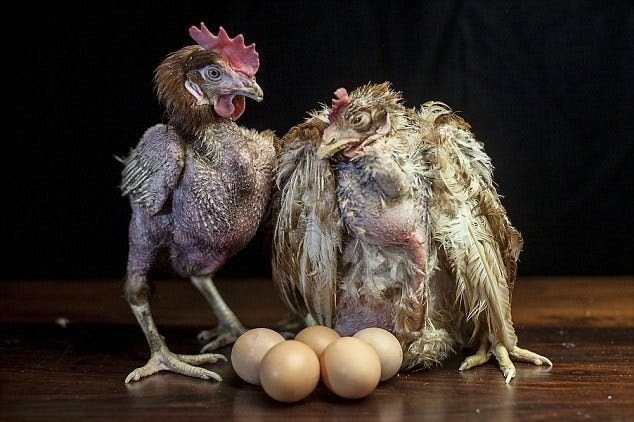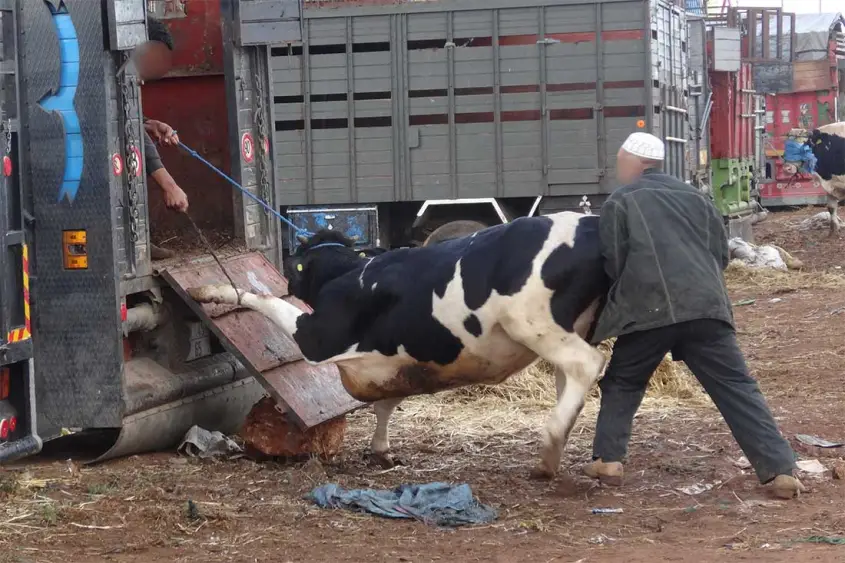
Factory farming, though not as prevalent in Morocco as in some other countries, is nonetheless a growing concern in the nation’s agricultural industry. With increasing demand for meat, eggs, and dairy products, industrial-scale farming operations have emerged to meet consumer needs. These factory farms often prioritize efficiency and profit over animal welfare, leading to overcrowded and unsanitary conditions for livestock.
In Morocco, factory farming practices can encompass various aspects of animal agriculture, including intensive production of poultry, cattle, and dairy. These operations typically involve confining large numbers of animals in confined spaces, with limited access to natural light, fresh air, or outdoor space. Animals may be subjected to routine practices such as debeaking, tail docking, and castration without anesthesia to minimize costs and maximize productivity.
The environmental impact of factory farming in Morocco is also a concern, with intensive livestock operations contributing to the pollution of air, water, and soil through the accumulation of waste and runoff from animal feedlots and manure lagoons. Additionally, the widespread use of antibiotics and growth hormones in factory farming can pose risks to public health through the development of antibiotic-resistant bacteria and the presence of hormone residues in food products.
While some efforts have been made to regulate and improve conditions in factory farms in Morocco, there is still much work to be done to ensure the humane treatment of animals, protect the environment, and promote sustainable agriculture practices. Public awareness, advocacy for animal welfare laws, and support for small-scale, sustainable farming operations are essential in addressing the challenges posed by factory farming in Morocco.
Factory farms that use intensive confinement systems deny animals many of their most basic behavioral and physical needs. Either through confinement in cages or overcrowding in feedlots and pens, the animals aren’t able to interact socially in a normal manner. These unnatural conditions often lead to aggression amongst the animals, as well as boredom, frustration, and stress.
The livestock industry often claims that these animals would not reproduce so well if they were stressed. However, we can look at puppy and kitty mills to see that this logic isn’t true. As well, drugs and hormones are routinely fed to these animals to combat the potential for disease outbreak, which is a much higher risk with so many animals so closely confined. These drugs are also given to speed up the animals’ growth..

In Morocco, factory farming practices involving cows primarily focus on intensive dairy production rather than beef production. These operations often involve confining dairy cows in large-scale facilities, where they are kept indoors for the majority of their lives and subjected to high-yield milking regimes.
In intensive dairy farming, cows are typically kept in crowded conditions with limited access to pasture or outdoor space. They may be housed in barns or feedlots and fed a diet designed to maximize milk production, often consisting of high-energy feed supplemented with grains and protein concentrates.
While intensive dairy farming can result in high milk yields, it also raises concerns about animal welfare. Cows may experience stress, discomfort, and health issues due to overcrowding, confinement, and the demands of high milk production. Additionally, routine practices such as tail docking, dehorning, and the use of growth hormones and antibiotics may be employed to manage cows and maximize productivity.
The environmental impact of intensive dairy farming in Morocco includes issues such as water pollution from manure runoff, greenhouse gas emissions from livestock production, and deforestation for feed crop cultivation. Efforts to promote more sustainable and humane dairy farming practices, such as pasture-based systems and organic production, are gaining traction as consumers become more aware of the ethical and environmental implications of factory farming.

Comprehensive Overview of Animal Welfare Issues in Morocco’s Livestock Industry
The Humane Society of Morocco reports a detailed examination of the severe and widespread animal welfare problems in Morocco’s livestock industry. Key findings include:
Transport
– Improper loading facilities, overcrowding, lack of separation between animals, and rough handling causing undue stress and suffering.
– Injured and sick animals not receiving proper care or being humanely euthanized.
– Unsanitary and unsuitable conditions, with animals forced to lie on the ground with their legs shackled.
Markets
– Severely injured animals abandoned without care, suffering unnecessarily prolonged.
– Unsanitary conditions, with animals lying on the ground with legs shackled for hours.
– Lack of water and shade, leading to dehydration and distress.
Slaughter
– Brutal slaughter practices, including throwing animals to the ground and restraining them violently.
– Lack of emergency measures for unfit animals, who are hidden away and abandoned.
Morocco currently lacks any specific animal welfare legislation, despite being an OIE member and having obligations to comply with OIE standards. A draft law has been proposed, but it lacks detailed provisions and its implementation timeline is unclear.
The report calls for urgent action to address the severe animal suffering in Morocco’s livestock industry. Key reasons cited include:
– Immense animal suffering
– Ethical obligation
– Compliance with international standards
– Link between animal health and welfare
– Economic and consumer interests
– Morocco’s international reputation
Comprehensive animal welfare legislation and enforcement mechanisms are needed to uphold the highest possible standards and protect animals from cruel treatment. The Moroccan government must take immediate action to enact such legislation to fulfill its ethical and international obligations.
| Cookie | Duration | Description |
|---|---|---|
| cookielawinfo-checkbox-analytics | 11 months | This cookie is set by GDPR Cookie Consent plugin. The cookie is used to store the user consent for the cookies in the category "Analytics". |
| cookielawinfo-checkbox-functional | 11 months | The cookie is set by GDPR cookie consent to record the user consent for the cookies in the category "Functional". |
| cookielawinfo-checkbox-necessary | 11 months | This cookie is set by GDPR Cookie Consent plugin. The cookies is used to store the user consent for the cookies in the category "Necessary". |
| cookielawinfo-checkbox-others | 11 months | This cookie is set by GDPR Cookie Consent plugin. The cookie is used to store the user consent for the cookies in the category "Other. |
| cookielawinfo-checkbox-performance | 11 months | This cookie is set by GDPR Cookie Consent plugin. The cookie is used to store the user consent for the cookies in the category "Performance". |
| viewed_cookie_policy | 11 months | The cookie is set by the GDPR Cookie Consent plugin and is used to store whether or not user has consented to the use of cookies. It does not store any personal data. |
Create an account or sign in to save pets you love.
Don't have an account? Contact us
Before you proceed with your adoption application, please review and accept our data handling practices:
Note: By clicking "I Agree & Continue", you will be redirected to an external application form. This tracking system logs your interest but does not capture data from the external form.
Create an account or sign in to save pets you love.
Don't have an account? Contact us
Before you proceed with your adoption application, please review and accept our data handling practices:
Note: By clicking "I Agree & Continue", you will be redirected to an external application form. This tracking system logs your interest but does not capture data from the external form.